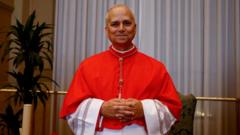The election of Pope Leo XIV marks a significant moment for the Catholic Church and the United States, with a focus on peace and community amidst a time of ideological challenges.
**First American Pope Elected: Cardinal Prevost Becomes Pope Leo XIV**

**First American Pope Elected: Cardinal Prevost Becomes Pope Leo XIV**
In a historic conclave, Cardinal Robert Francis Prevost has been elected as the first American pope. Taking the name Leo XIV, he emphasizes peace and unity for the global Catholic community.
Cardinal Robert Francis Prevost was elected on May 8, 2025, becoming Pope Leo XIV, the first American to hold the papal office. The announcement came from St. Peter’s Basilica, where white smoke signaled the conclusion of the conclave after just over a day of voting among the 133 cardinals. The pontiff addressed the crowd, urging a commitment to peace and a united Church.
Born in Chicago and cherished for his extensive service in Peru, Pope Leo XIV's election has elicited reactions of surprise and pride across the United States, particularly in his hometown. President Trump and various American Catholics hailed the selection as a significant honor for the country. Throughout his first public address, he emphasized themes of peace and justice, reflecting the values of his predecessor, Pope Francis.
Even though Leo was born in a global superpower, his election breaks long-held expectations that such a position would elude representatives from nations with considerable international influence. Supporters hope he will navigate the ideological divides within the Church, striving to be a balanced figure who can effectively lead in a time of transition.
His immediate mission will range from fortifying the Church's response to global issues to handling internal dynamics influenced by his heritage and past experiences as a bishop and leader in an international religious order. Pope Leo XIV's election serves as a defining moment for Catholics in America, encouraging hope for a bridge between different faith perspectives in a world grappling with division and uncertainty.
Amid celebration and relief in Vatican City, the initial reactions of the public showcased mixed feelings, with some puzzled over his relatively unknown stature among prospective leaders before the conclave. Yet, the active engagement of diverse voices underscores the evolving nature of the Catholic dialogue, as many are left hopeful that this new papacy will convey compassion and adaptability in addressing both faithful and secular concerns.
From Chicago to Rome, the message is clear: a new era begins not only for the Church but potentially for global diplomacy, promoting cooperation amid current tensions that span political, social, and cultural boundaries. As events unfold, many will be watching to see how Pope Leo XIV shapes his papacy in an interconnected world, balancing respect for tradition with the need for reform and renewal.























